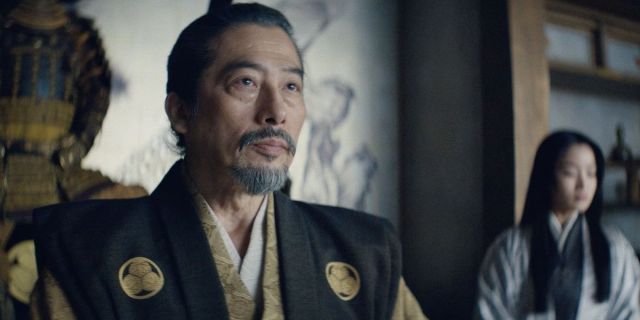Adapting James Clavell’s Shogun was an uphill battle. The original novel is widely beloved, and its 1980 miniseries adaptation is remembered fondly by many. The book and show suffer accurate accusations of indulgence in white savior tropes. Unlike Dune, Shogun isn’t a subversion. It’s a story about a white guy who saves Japan with a unique English perspective. Rachel Kondo and Justin Marks’ Shogun fixed the problem by shifting focus to a more engaging character.
Shogun is a triumph of marketing. Streaming is wildly oversaturated with options, but this samurai drama rocketed to the top of its charts in seconds. Its first ads featured spellbinding cinematography and a few key dialogue lines. More recent trailers see the series’ star speak on the show’s importance. Fans paying attention will notice whose testimony provided such a glowing endorsement.
Lord Yoshii Toranaga is Shogun‘s Main Character
Lord Yoshii Toranaga is the driving force behind Shogun‘s narrative. His political genius weaves the plot and forges the heroic side of the conflict. Lord Toranaga is one of five daimyo regents fighting for control of Japan in the wake of the second great unifier, Taikō. Taikō’s son is too young to inherit his father’s position, prompting him to craft a political stalemate between the five ambitious warlords. Lord Toranaga carries the legacy of the mighty House of Minowara, which invites challenges from his rivals. Toranaga feels immense pressure from four powerful enemies, but his quiet genius keeps him alive. When a spy tells him of an Englishman who washed ashore in Anjiro, he pulls strings to bring the outsider to him. Toranaga wields his new ally’s knowledge to work against the other daimyo and reach his lofty ambitions. His central presence in the series comes from his character and the performer behind him.
Hiroyuki Sanada portrays Lord Toranaga in Shogun. The 1980 miniseries cast the late, great Toshiro Mifune in the role. The performers share more than one might think. Sanada started acting when he was five and made his feature debut just after he turned six. He played Sonny Chiba’s son three times, then became the legendary martial artist’s protégé. A year after he joined the Royal Shakespeare Company, Sanada earned his international break in The Last Samurai. His first introduction to many American audiences became one of the most hotly debated examples of historical revisionism and white savior mythology. In the intervening decades, he’s most frequently typecast as a criminal (Rush Hour 3, Avengers: Endgame, Bullet Train,) a businessman (Army of the Dead, Speed Racer), or, of course, a samurai. Sanada is Hollywood’s go-to samurai, and he’s stellar at it. Almost every character he’s played in the past twenty years draws a sword or chats about honor. Most of these examples are trope-filled examples of Westerners drawing from a foreign culture to look cool. Shogun is the first example of Sanada turning the white savior narrative around and telling his samurai story.
John Blackthorne is More Interesting as an Outsider
Consider the hero of most genre narratives. In something like Harry Potter or the original Star Wars, the protagonist typically is an outsider. They’ve been separated from the hidden circumstances that drive the plot and subjected to a mundane life until someone, usually an older man with connections to their parents, informs them of their destiny. They come from another world, sometimes literally, and learn the ways of an ancient society until they outperform their teachers. Not to compare feudal Japan to an alien planet, but Shogun uses similar storytelling techniques.
John Blackthorne wanders into a culture he doesn’t understand, demonstrates mastery of imperative skills, and saves Lord Toranaga multiple times. They aren’t treated as equals throughout the story. Lord Toranaga has a position of power, but his military might place him outside the realm of reliability. The book and the first series treat him as one of the great trends and forces of history. He’s used as a means to the end of propelling Blackthorne to greatness. The latest show rearranges the characters and central focus, allowing Lord Toranaga his due. Blackthorne is no longer the lens through which the audience views Japan. He’s an outsider with a role to play and nothing more.
Shogun immediately became one of the most talked-about series on TV today. It’s an instant classic with production value, presentation, and storytelling skills to make it an early favorite for endless awards. Part of its success is steeped in the history of its narrative and its performers. Lord Toranaga should have always commanded the audience’s attention. His rise to power is the driving force behind the narrative, and John Blackthorne has always been a tool in that arsenal. Lord Toranaga deserves the attention of a show named after his eventual title.











Leave a Reply